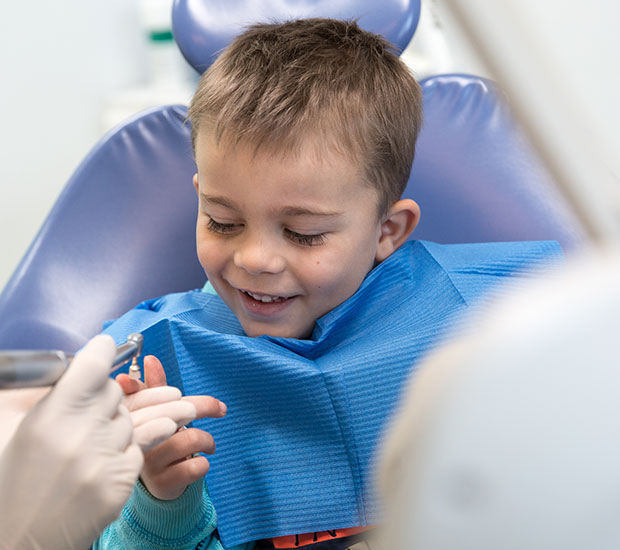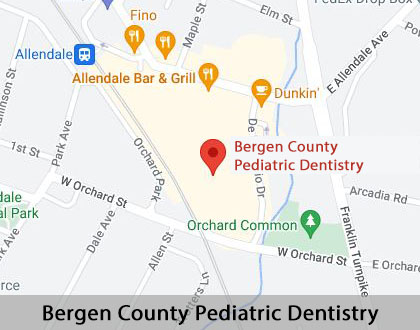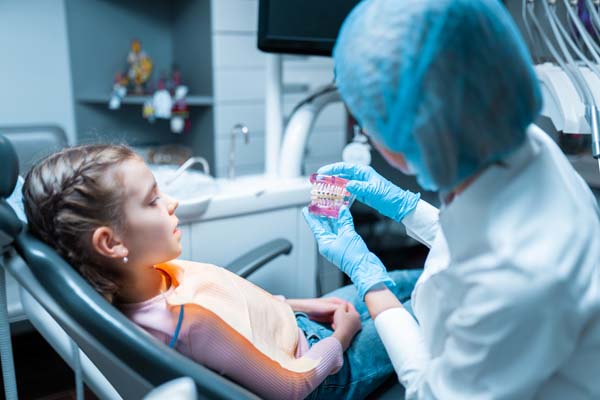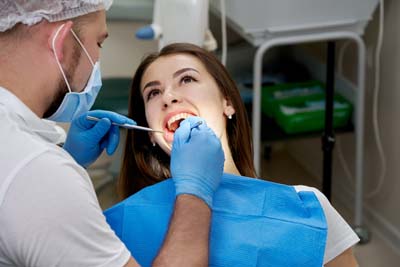Cavity Treatment Options Allendale, NJ
Children can develop cavities due to poor oral hygiene, diet, or a genetic predisposition. Fortunately, there are various cavity treatment options to remove decay and save teeth. Cavity treatment can resolve the problem and improve your child's oral health.
Bergen County Pediatric Dentistry offers cavity treatment options in Allendale and the surrounding area. If your child has a cavity, our team can help restore and protect their teeth. Call us at (201) 312-6937 for more information about our services or schedule an appointment.
Diagnosing a Cavity
Cavities are one of the most common dental problems in children. They are a permanently damaged area in a tooth that occurs due to tooth decay. Patients are often surprised to learn that they have a cavity. This is due to the fact that early cavities often cause no symptoms and are not visible to the untrained eye. The best way to determine whether a child has a cavity is through a regular dental check-up.
We will examine the teeth for any soft spots or visual signs of a cavity during this appointment. X-rays can also help check between the teeth where a visual examination cannot reach. The sooner cavities are detected, the better since early treatment prevents the cavity from getting bigger. Untreated cavities can cause greater dental problems and complications.
“The best way to determine whether a child has a cavity is through a regular dental check-up.”
Cavity Treatment Options
Various cavity treatment options are available depending on the patient’s needs. In the early stages, the cavity might be reversible. We may recommend professional fluoride treatments to restore the tooth enamel. If treatment cannot reverse the cavity, the most common treatment is a filling. To place a filling out team will numb the tooth and drill out the decay. Then, we will fill the tooth with the patient’s chosen filling material.
If a child has extensive decay, they might need extra care, such as drilling away a significant portion of the tooth. In this case, the patient may need a crown or cap to protect the remaining tooth from breakage and to restore its appearance. When we cannot restore a tooth in severe cases, a child may require a tooth extraction. However, tooth extractions are only a last resort. Regular dental checkups are crucial since they allow us to diagnose cavities before becoming too large and leading to greater problems.
“In the early stages, the cavity might be reversible.”
What To Do About a Suspected Cavity
Parents who suspect that their child has a cavity should schedule a dental appointment as soon as possible. They should let our team know about any symptoms they have noticed in their child. It is also helpful for parents to prepare their child before their dental visit.
Children may feel nervous or scared before a visit to the dentist for a cavity. Parents can help by reassuring their children that the dentist wants to help keep their teeth healthy. Some books and television shows can also provide helpful, child-friendly explanations of the process.
“Parents who suspect that their child has a cavity should schedule a dental appointment as soon as possible.”
Check out what others are saying about our dental services on Yelp: Cavity Treatment Options in Allendale, NJ
Pain and Other Risks of Untreated Cavities
Children who are experiencing dental pain should receive treatment right away. Parents should contact our office and schedule an appointment to diagnose the problem and develop the appropriate treatment plan. Delaying treatment can put a child’s oral health at risk.
Tooth decay spreads quickly, and dental problems can worsen without warning. The sooner a child gets their cavity treated, the better. Untreated cavities can lead to an infection in the tooth called a tooth abscess and destroy the inner tooth pulp. Treatment will prevent the problem from worsening or spreading to other teeth. Once the cavity receives treatment, a child’s tooth pain and discomfort will disappear.
“Tooth decay spreads quickly, and dental problems can worsen without warning.”
Questions Answered on This Page
Q. What are the cavity treatment options?
Q. What should parents do about a suspected cavity?
Q. What happens if I put off getting the cavity filled?
Q. What should parents do at home while waiting for their child’s appointment?
People Also Ask
Q. How can I determine if my child needs orthodontic care?
Home Treatment Options
In some cases, a child must wait a few days to receive cavity treatment. As a child waits for their appointment, parents should ensure that their child continues brushing and flossing. During mealtimes, offer soft, room-temperature foods and drinks.
We also recommend avoiding sharp, crunchy, sticky foods. Our team can also recommend some over-the-counter medications to minimize discomfort and tooth pain. A cold compress against the face and jaw can also provide some relief.
“As a child waits for their appointment, parents should ensure that their child continues brushing and flossing.”
Frequently Asked Questions
Q. What is a cavity?
A. Cavities are decayed areas on the surface of the teeth. They usually develop due to bacteria in your mouth. These bacteria feed on sugar, then produce an acid that damages tooth enamel. Without treatment, the tooth might become severely decayed or infected. Prompt cavity treatment helps avoid these outcomes.
Q. How are cavities diagnosed?
A. Larger cavities might be visible to the naked eye. Our team may spot a cavity during a visual exam or cleaning. A cavity might also turn up on an X-ray or imaging test.
Q. How are cavities treated?
A. If a child has a cavity, they should receive treatment quickly. Early cavity treatment prevents the problem from worsening. Fillings can repair most small cavities. If the tooth has severe decay, it may need further treatment. Our team will determine the best treatment plan for each patient’s unique needs.
Q. How can I prevent cavities?
A. Good oral hygiene helps fight against cavities. Parents should ensure that their children brush twice each day and floss daily. We recommend avoiding sweets and sugary beverages and taking children for regular dental exams and cleanings.
Q. Can cavities be fixed at home?
A. Once a cavity has formed, at-home treatments will not get rid of it. Professional dental care is the only way to restore and protect a tooth from decay fully. Parents should report their child’s new or worsening tooth pain to our team right away.
Quality Pediatric Dental Services Can Transform Smiles
By visiting us as soon as possible, our team can help get your child the professional treatment they need.
Definition of Pediatric Dental Terminology
Call Us Today
Cavities are a common but treatable childhood dental concern. Our team at call Bergen County Pediatric Dentistry can treat tooth decay and prevent future dental problems. Call us at 201-312-6937 to learn more about our services or schedule an appointment.
If you live in the Allendale area, call 201-312-6937 for an appointment in our Allendale office.
Helpful Related Links
- American Dental Association (ADA). Glossary of Dental Terms. 2023
About our business and website security
- Bergen County Pediatric Dentistry was established in 2023.
- We accept the following payment methods: American Express, Cash, Check, Discover, MasterCard, and Visa
- We serve patients from the following counties: Bergen County
- We serve patients from the following cities: Allendale, Saddle River, Ramsey, Waldwick, Wyckoff, Franklin Lakes, Mahwah, Park Ridge, Ho-Ho-Kus, Midland Park, and Ridgewood
- Norton Safe Web. View Details
- Trend Micro Site Safety Center. View Details
Back to top of Cavity Treatment Options







